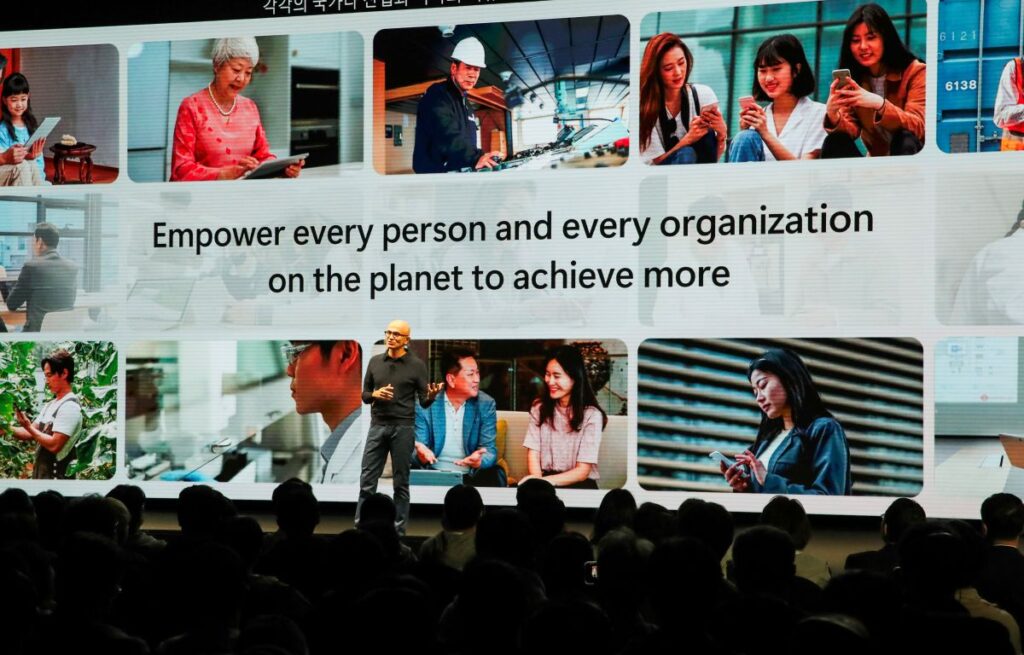
The 2025 Annual Work Trend Index: The Frontier Firm is born
The 2025 Work Trend Index Annual Report is designed to prepare leaders and employees for the AI shift.

This blog is part of the AI worldwide tour series, which highlights customers from around the globe who are embracing AI to achieve more. Read about how customers are using responsible AI to drive social impact and business transformation with Global AI innovation.
South Korea is rapidly establishing itself as a global force in AI innovation, propelled by a unique blend of industrial strength, technological ambition, and cultural adaptability. From healthcare to renewable energy, Korean organizations are actively deploying AI to reimagine systems, improve efficiency, and create entirely new value.
This nationwide momentum is supported by a growing ecosystem of partners with investments in infrastructure, cloud platforms, and nationwide skilling. Microsoft is expanding access to AI and strengthening Korea’s long-term digital resilience via partnerships with Korean enterprises and institutions, supporting responsible and scalable adoption grounded in transparency, security, and fairness.
At the Microsoft AI Tour in Seoul, Korean companies demonstrated how AI is moving beyond efficiency gains to become a true growth engine—reshaping customer experiences, opening new markets, and driving cross-industry collaboration for a more innovative, inclusive future.
KT, one of South Korea’s largest telecommunications and digital services companies, is driving large-scale AI and cloud. As part of its enterprise transformation, KT has deployed Microsoft 365 Copilot company-wide, using AI to streamline operations and enhance workplace efficiency. In collaboration with Microsoft, their dedicated Center of Excellence (CoE) supports the development of AI-powered systems across teams.
To meet the needs of highly regulated industries, KT is building a secure public cloud based on Microsoft Cloud for Sovereignty. This infrastructure will support scalable, compliant AI adoption in sectors such as public services and finance.
Meanwhile, KT is also developing a large language model (LLM) optimized for the Korean language and cultural context. The model will be embedded into KT’s customer service to deliver next-generation AI experiences.
What are large language models?
Learn moreTo promote broad, inclusive workforce development, the company is launching a nationwide AI skilling initiative with new training centers that will equip university students, professionals, and the general public with practical AI knowledge. With this multifaceted strategy, KT is advancing its digital capabilities and enabling AI innovation across Korea’s public and private sectors.
LG Electronics, a global leader in consumer electronics and smart home technology, is expanding the role of AI in daily life with the introduction of its AI home robot Q9, developed using Azure OpenAI Service. Designed to go beyond basic smart appliance control, Q9 supports functions such as elderly care, childcare, and overall home management.
The robot integrates Microsoft’s voice AI with LG’s own AI agent FURON to allow natural user interactions and adaptive learning. It serves as a central AI hub, connecting with and coordinating smart devices throughout the home to create a responsive living environment tailored to individual needs.
Q9 reflects LG’s vision for the smart home as an active, AI-powered ecosystem that enhances convenience, comfort, and support for daily routines. By combining conversational AI with practical applications, LG is shaping a new category of home technology focused on human-centered design.
Seegene, a leading biotechnology and molecular diagnostics company based in South Korea, is transforming how PCR testing kits are developed with its AI-powered Seegene Digitalized Development System (SGDDS).
Originally created by Seegene and further advanced in partnership with Microsoft, SGDDS automates the critical planning and design stages of PCR testing kit development—steps that have traditionally required large teams of experts. By streamlining these processes, the platform enables even non-specialists to participate, accelerating research timelines and improving development efficiency.
Powered by AI and data analytics, SGDDS helps standardize and simplify the development process, allowing Seegene to respond more quickly and precisely to emerging health threats. This capability expands access to accurate diagnostics and strengthens global preparedness for future public health challenges.
Through the integration of AI into its core research and development (R&D) operations, Seegene is building a more agile and scalable approach to healthcare innovation. Its collaboration with Microsoft also supports broader technology-sharing efforts designed to improve diagnostic infrastructure across global markets.
Hanwha Qcells, a global leader in solar energy solutions, is advancing smart energy management by integrating Azure OpenAI Service and Internet of Things (IoT) technology. In response to the urgent challenges of climate change and resource depletion, the company is using AI to optimize solar power usage and enhance system efficiency across its operations.
By combining real-time data from IoT devices with AI-powered analytics, Hanwha Qcells is developing intelligent energy strategies that improve performance and support sustainability goals. The AI models help forecast energy needs, identify inefficiencies, and adjust power usage dynamically—laying the groundwork for more resilient and eco-friendly infrastructure.
Through its collaboration with Microsoft, Hanwha Qcells is not only improving operational efficiency but also creating scalable solutions for the global energy transition. These innovations support the development of clean energy ecosystems while opening new business opportunities in an increasingly AI-powered market.
Galaxy Corporation, a South Korea–based AI enter-tech company, is reshaping digital content creation with Sora, its proprietary AI platform powered by Azure OpenAI Service. Designed to support creative professionals, Sora applies generative AI to assist in content development across video, animation, and other entertainment formats.
By embedding AI into the creative workflow, Galaxy Corporation is expanding the role of technology as an active partner in idea generation and production. Sora enables faster prototyping, helps refine concepts, and introduces new possibilities for immersive storytelling—bringing imagination to life with greater speed and scale.
Galaxy Corporation plans to continue expanding its AI offerings to meet the growing demand for innovation in entertainment. Galaxy Corporation is deeply committed to exploring the possibilities of the enter-tech creative vision of artists in this era of rapid innovation. By using AI to overcome creative limitations and redefine the standards of content development, the company is fostering a dynamic synergy between entertainment and AI technology. By positioning AI as a core creative tool, this approach not only reimagines experiences entirely but also delivers transformative content value to audiences, paving the way for a more meaningful, dynamic, and forward-thinking future in content creation.
Amorepacific, South Korea’s largest beauty and cosmetics company, is known for its trend-setting brands and deep understanding of consumer needs. In the fast-moving K-beauty market—where skincare routines are complex and trends shift quickly—delivering timely, personalized guidance has become both a challenge and a competitive advantage.
To meet that need, Amorepacific is developing the AI Beauty Counselor (AIBC), a generative AI-powered app built on Microsoft’s Azure AI stack. The solution analyzes user photos to assess facial features and skin tone, then offers makeup recommendations informed by data from professional artists. To deepen personalization, users can chat with AIBC to share their skin care concerns, ask questions, and report on their post-sale experience.
By integrating AI into the consultation experience, Amorepacific is helping customers navigate beauty choices with confidence while staying ahead of evolving trends.
What sets South Korea apart in the global AI landscape is not only its rapid adoption of new technologies, but its intentional, people-centered approach to applying them. Korean enterprises are using AI to address real-world challenges, and these innovations are rooted in Korea’s industrial expertise and cultural context, with AI deployed to create practical value across sectors.

Aligned with the theme “AI for Everyone,” South Korea’s AI transformation reflects a belief that this technology should be accessible, inclusive, and impactful across all sectors of society. Microsoft supports this vision through close collaboration with Korean institutions and businesses—advancing skilling initiatives, education programs, and trusted cloud infrastructure to help turn bold ideas into lasting results.
Meanwhile, as AI becomes central to how organizations compete and collaborate, trust is essential. Microsoft’s focus on ethical development, responsible deployment, and secure systems enables Korean companies to build AI solutions that are not only powerful but grounded in both innovation and social responsibility.

South Korea’s AI momentum is accelerating, crossing boundaries between industries, strengthening competitiveness, and opening space for new partnerships. With the right foundation and a clear commitment to inclusion, responsibility, and innovation, the country is showing what a truly accessible, future-ready AI ecosystem can look like—for everyone.